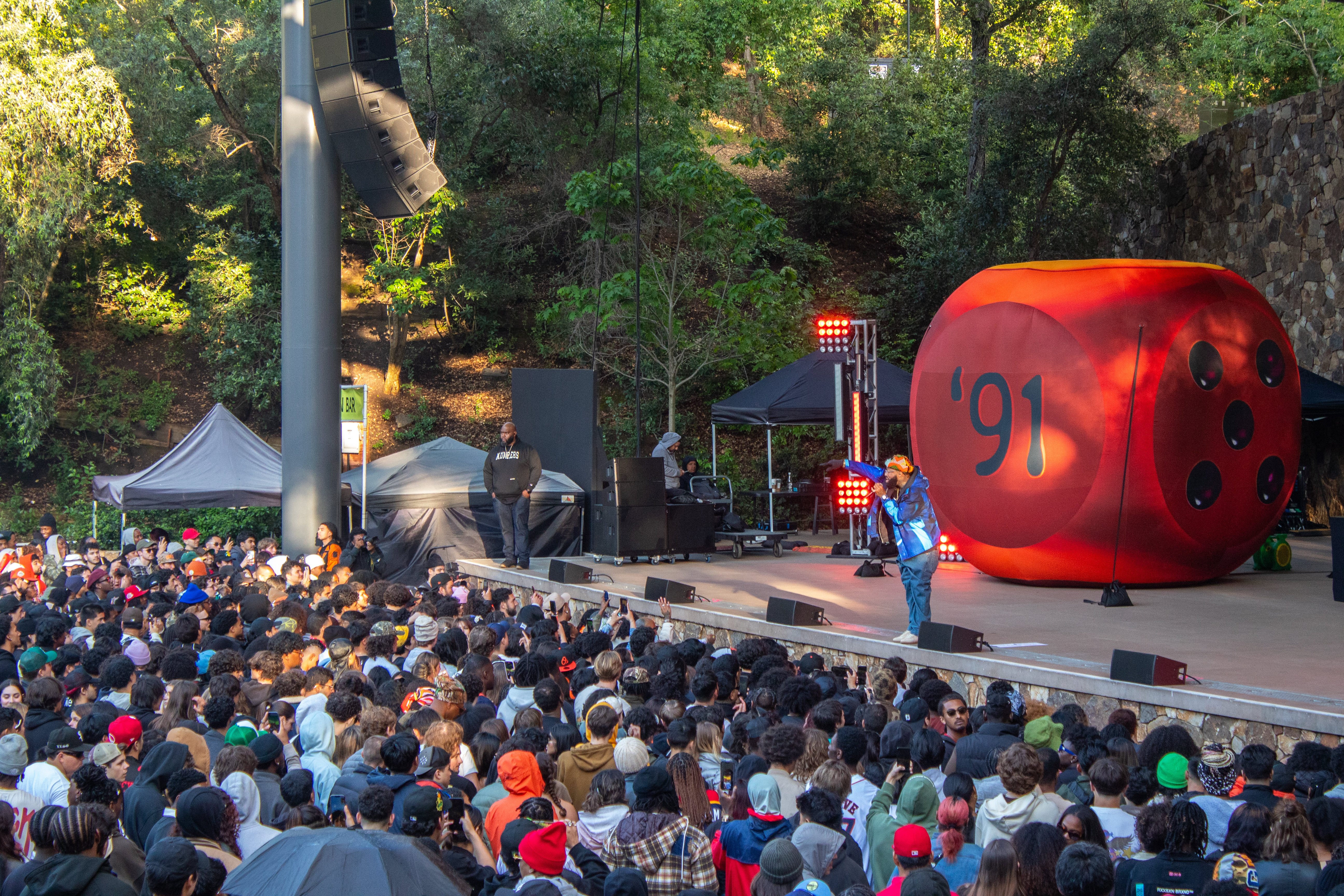Editor’s Note: This article is a review and includes subjective opinions, thoughts and critiques.
Blackfest 2024 brought a wave of energy and culture to Frost Amphitheater on Saturday, celebrating the spirited world of hip-hop music and art even amid ever-changing weather conditions. The rainy start did not dampen the mood of the attendees, as the atmosphere quickly heated up with vivacious performances.
As I stepped into the venue, I was met with a dynamic presentation of each of Stanford D9 organizations (historically Black fraternities and sororities) stepping. Everyone was dressed up impressively; whether it was Delta Sigma Theta Sorority Inc. wearing cowboy hats with red bandanas, or Omega Psi Phi Fraternity Inc. wearing golden combat boots to complement their purple letters, each performer brought an infectious energy to the presentation while also educating the crowd about the histories of their organizations.
Each group performed its own routine, but by the end, they all came together on stage and strolled to “The Nasty Song” by Lil Ru. This was by far my favorite moment of the presentation, as every D9 organization brought unique strolls to the same song.
Various members of these organizations stayed past their presentations and became a part of the general crowd, which was made up of both Stanford students and Bay Area residents. Whenever the DJ played tunes that had stroll routines associated with them (i.e. “Faneto” by Chief Keef, “Wipe Me Down” by Trill Family), D9 members started strolling in the crowd with the audience, hyping them up in cadence to every step.
The DJ served as a sonic architect in between Blackfest’s larger performances, weaving together a tapestry of sounds that paid homage to the richness of Black culture. He played songs ranging from anthems like “Blow the Whistle,” which carries the distinct vibe of the Bay Area, to classics like “Before I Let Go” that led the entire crowd to dance in step. Hearing these tunes evoked memories of family cookouts and joyous gatherings.
The DJ also curated a playlist that resonated with attendees of all ages, playing a blend of old-school favorites like “This Is How We Do It” and contemporary hits. As a Black student myself, I saw this DJ set to be a testament to the enduring power of Black music and culture. The younger college-age audience in the front pit enthusiastically sang along, illustrating how these timeless tunes are passed down from generation to generation, cementing a legacy of rhythm, soul and community.
As the DJ concluded his set, the stage was set for Blackfest’s first headliner performance. Redveil, a 20-year-old Marcus Morton from Washington D.C., took the stage amidst the clearing skies, delivering a groovy, hip-hop-infused set. Despite some unfamiliarity with his music, the crowd maintained a constant high energy, vibing along to his beats.
Redveil left a lasting impact by sharing a message calling for the freedom of Congo, Haiti, Palestine and the world. This message stuck a chord with many, accompanied by a pulsating calypso rhythm that transported listeners to distant shores. Not everyone in the audience was fully on board, as an attendee shouted “Please go back to Maryland!” A few other fans in the crowd chuckled a bit, but there was not much of an adverse reaction to the fan’s words.
Overall, I enjoyed redveil’s performance, as it was reminiscent of Tyler the Creator’s eclectic style, punctuated by energetic mosh pits that underscored the electrifying ambiance.
The spirit of Blackfest remained undeterred in spite of returning sprinkles of rain, with headliner Larry June taking the stage. The San Francisco native performed a set that exuded far more laid-back vibes compared to the preceding act. Despite being met with a somewhat subdued response initially, Larry June’s smooth flow and catchy tunes gradually captivated the audience.
The backdrop hinted at a psychedelic aesthetic with its vibrant primary colors, which added an extra layer of visual intrigue. Then, out of the blue, June started throwing oranges into the crowd, further enhancing the festive atmosphere though the energy waned halfway through.
Nevertheless, the artist managed to reignite the excitement of the crowd by playing some of his better-known hits such as “Feeling Good Today” and “89 Earthquake.” He also brought out emerging artist Prezi, who seized the moment to promote his own music — a move met with a knowing nod from the crowd, acknowledging that “Game Recognize Game.” The highlight of June’s set came when he jumped into the crowd while performing “Smoothies in 1991,” eliciting a thunderous response from the audience and reaffirming the undeniable connection between artist and fan.
This year’s Blackfest cemented the event’s status as one that “provides a space for the Black community at Stanford and the broader Bay Area to come together and take back the space that they’ve historically been denied.” Even though the weather was a bit chilly for an outdoor festival, I left Blackfest content, having deepened my understanding of Black culture across generations.
